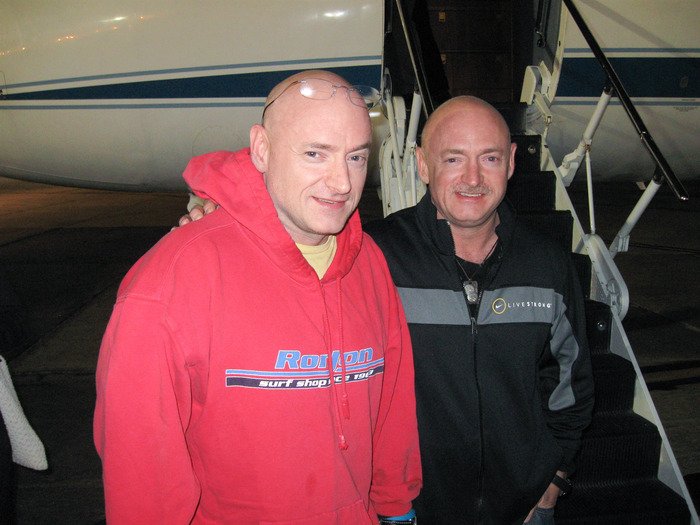Expedition 26 Commander Scott Kelly (left), is reunited with twin brother, Mark Kelly on March 17, 2011, following a flight to Ellington Field in Houston from Kustanay, Kazakhstan after 157 days on the International Space Station. Credit: NASA
GREENBELT, Md., Aug. 9 (UPI) -- NASA says twin astronauts Scott and Mark Kelly have agreed to take part in an unprecedented research study on the human effects of spaceflight.
NASA's Human Research Program realized another opportunity to study astronaut twins would be rare and took the brothers up on their offer of genetic comparison in the name of human space exploration.
Potential researchers have been asked to propose limited, short-term investigations for observational comparison between astronaut Scott Kelly and his identical twin brother, retired astronaut Mark Kelly, the space agency said Thursday.
These pilot demonstration projects, the agency said, would be unique investigations into the genetic aspects of spaceflight.
"This is a once-in-a-space-program opportunity," John Charles, chief of the HRP's International Science Office, said. "The mission of the HRP is to reduce the risk to astronauts during long-duration space flight.
"In typical investigations, we usually have a specific outcome in mind and are goal-oriented. In this case, the slate is essentially blank. I am anxious to see what proposals we receive from the scientific community."
The selected investigations will occur during astronaut Scott Kelly's yearlong spaceflight to the International Space station beginning in March 2015, the longest space mission ever assigned to a NASA astronaut, he said.
Retired astronaut Mark Kelly will live his normal life on Earth during that period, giving researchers a chance to compare data collected from genetically similar astronauts to observe the human effects of spaceflight.
Tentative plans for data collection on the twins currently include blood sampling on Scott at regular intervals before, during and after the one-year mission on the space station and corresponding blood sampling on Mark, who will otherwise be living his normal lifestyle in Arizona, in an effort to study the effects of the space environment on human DNA, NASA said.
"The genetic revolution has reached space science and the space age," Charles said. "This is an opportunity to explore and see what's out there. We are prepared for any kind of suggestions that the scientific community presents that are peer-reviewed."















